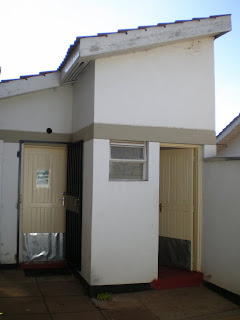
The patients and patients' families do an extraordinary job of taking care of each other. Neighboring patients will pick up food for two, if their neighbor isn't able to walk. Families of patients will translate, if another patient doesn't speak Swahili. (Below is patient breakfast)

The stories of many of the patients I will carry with me for quite some time.
I met a patient my first week on the wards who was carried to the hospital by her sister. She was a cachectic, wasted, skeleton of a woman, sweating, and short of breath. She was found to be HIV positive, and put on treatment for a pretty nasty pneumonia, infectious diarrhea, and oral thrush. Later, she gained enough strength to take walks, eventually making all the way to the hospital entrance. Upon her impending discharge, she asked me for something to remember me by. Joe took this picture of the two of us, that we printed, and gave to her.

I had another patient whose grandchildren and great grandchildren brought her in for a headache and neck stiffness. The patient spoke only Nandi, the first language spoken in the region I traveled to last weekend. I asked the family how old the patient was, and a lively discussion erupted as to whether she was 80 or 90 years old. Regardless of her age, this patient was very sick, and the family very close. Kenyan patients have to pay for major services as they go, such as imaging and expensive drugs. We suspected that this patient might have a head bleed, and so asked the family if they could afford CT. They had the money together faster than any other family I've seen. I commented how quickly it happened, and they clued me into the fact that this patient had over 150 grandchildren and great-grandchildren, so it was relatively easy.

Her head CT confirmed our suspicions. By the end of her hospital course, the patient was more comfortable, and she thanked me for helping to take care of her. The family all gave me hugs, even after I explained to them that their loved-one might have a limited recovery, and prognosis.

A third memorable patient was an incredibly sweet 15 year old with Rheumatic Heart Disease (RHD). The incidence of RHD and Rheumatic Fever sharply declined in the West after the discovery and widespread availability of penicillin to treat streptococcal pharyngitis, of which RHD is a sequelae. This particular patient has had RHD since an undetermined, very young age, and is suffering from end-stage heart failure because of it. She came to the hospital with shortness of breath on exertion and swelling of her lower legs, as well as gross ascites (fluid around the liver). We were able to alleviate her immediate and severe symptoms, but to correct her disease, she really needs a heart valve replacement (and needed one years ago). Nairobi is the only place those are done in Kenya, and her mother, who was there day and night for her weeklong stay, is not able to pay for such a surgery.

The students on my team were hard-working and very caring. Here are the sixth years, who graduate in December 2009 (medical school admission is directly from high school and for a total of six years).

Next week I will begin pediatrics, which will frighteningly be some of my last training in the field before I start residency. My classmates and I are currently in the window period. We have submitted our final rank-lists to the national residency match program, but will not find out until March 19th. So keep your fingers crossed! More on our lovely weekend later. Lala salama.
- Anne
















































